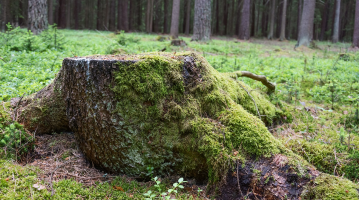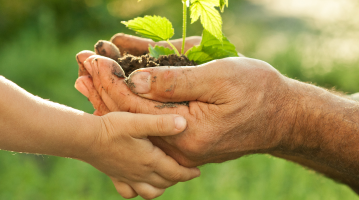Man's impact on biodiversity
Put simply, to undermine biodiversity is to jeopardise the conditions for life on Earth. Although they’ve always existed, the many threats to living things are increasingly exacerbated by human activity.
Biodiversity is essential for life. Every living thing has its place and its role, and we all depend on one another to function properly within sustainable ecosystems. Put simply, to undermine biodiversity is to jeopardise the conditions for life on Earth. Although they’ve always existed, the many threats to living things are increasingly exacerbated by human activity, to the point that we’re running the risk of our own extinction.
Threats to biodiversity
Thanks to the work carried out over the last thirty years by the various bodies responsible for biodiversity around the world, we’ve reached a conclusion that’s as certain as it is chilling: biodiversity is in freefall. Barely 1.8 million species have been catalogued worldwide, out of the 5-100 million thought to exist. Around 15,000 new species are discovered every year. So at least we know how much we don’t know! But is the fact that living things appear and disappear just another law of evolution? Let’s not put all the blame on Darwin. While some species have indeed evolved or disappeared over the billions of years that life has existed on Earth, biodiversity loss has never been as massive and meteoric as it has been over the last two centuries – 10 to 1,000 times faster than the natural rate, leading to the idea of a sixth mass extinction event, capable of irreparably damaging many ecosystems. So what’s changed over the last 200 years? Human pressures are the first and only direct cause of this meteoric collapse in biodiversity. The human species accounts for just 0.1% of all terrestrial biomass (550Gt of carbon) and 3% of animal biomass (2Gt), but its impact on ecosystems is disproportionate and constantly growing.
(Source: biodiversité.gouv.fr)
France’s National Biodiversity Agency lists five major human factors that affect biodiversity: changes in how we use natural environments, pollution, over-exploitation of natural resources, climate change and invasive exotic species. These causes combine to profoundly alter the relationships between species. Relationships on which we depend far more than we realise.
1. Changes in how we use natural environments
Converting natural environments into artificial ones is the main cause of the destruction and fragmentation of ecosystems. Clearing forests to make way for roads, damming watercourses, concreting over wetlands to make way for car parks... Humans are disrupting the free movement and reproduction cycles of many species. But behind these visible threats, there are also other forms that are much less visible, like the intensification and expansion of agricultural land, which is leading to the deforestation of vast areas of forest. This phenomenon, known as “artificialisation”, leads to the destruction, degradation and fragmentation of habitats, both on land and at sea, the disturbance of species, as well as the degradation of soils and their essential functions (hosting species, capturing CO2, limiting erosion, preventing flooding, etc.).
2. Pollution
Air, soil, water, light and sound pollution affect every aspect of the environment, making habitats uninhabitable and violently disrupting the life cycle of species to the point where they can no longer survive and have no room to evolve or change their habitats. We often think of the most obvious forms of pollution, like fine particles in the air, toxic waste in rivers or microplastics in the oceans, but lots of pollution is much more insidious. For example, the noise generated by constant fishing boat traffic and offshore industries disrupts the sonar function of cetaceans, which – now disorientated – run aground on beaches or swim up freshwater rivers where they die of malnutrition. Some types of water pollution, particularly the accumulation of nitrogen and phosphorus, encourage the proliferation of algae species that suffocate their surroundings and eventually make it unfit for other species to live there.
3. Over-exploitation of resources
This is when we use natural resources excessively (water, wood, energy, agricultural products, etc.) beyond their capacity for spontaneous regeneration. It applies to certain intensive agricultural practices, over-fishing, unregulated hunting, deforestation and unsustainable forest exploration, over-harvesting for recreational activities, and so on. These large-scale behaviours seriously compromise the proper functioning of ecosystems and, ultimately, their ability to sustainably support our lifestyles and consumption habits.
4. Climate change
Caused by the concentration of greenhouse gases in the atmosphere as a result of human activity, climate change is profoundly altering the life cycles of all living things. It impacts the geographical distribution of species and therefore the food chain. And this disruption is global. Higher temperatures, wildfires, storms, rising sea levels, floods... we tend to see climate change through the prism of the damage it does to our lives as humans, but these events have an impact on all ecosystems and all living things.
5. Invasive exotic species
The intentional or unintentional introduction of invasive exotic species by humans has led to the disappearance of many native species in the ecosystems they take over, or “parasitise”. It’s not just the Louisiana crayfish, the Asian hornet, the coypu or the red-eared slider that we know about, but a large number of terrestrial and aquatic plants are displaced from their places of origin every year because of human activity and imported into new ecosystems where they wreak havoc.

Causes and consequences of deforestation
Find out more about the threats to biodiversity and how to preserve it

How to preserve biodiversity?
Preserving biodiversity might seem like a gargantuan task, but we can all do our bit.
